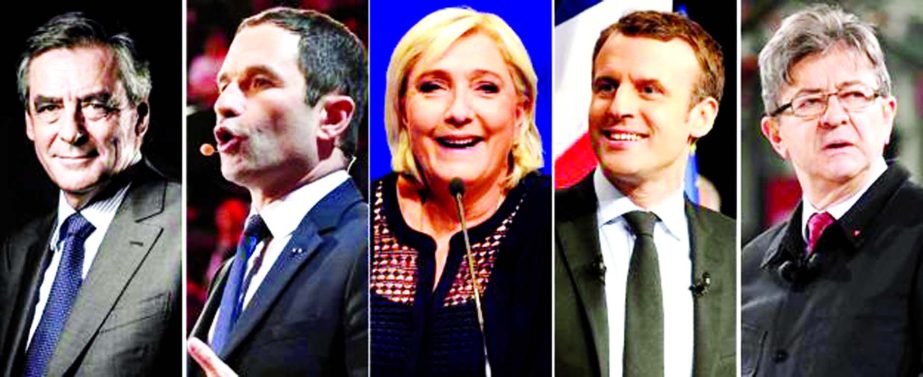
AFP :
French voters flocked to the polls under heavy security Sunday in the first round of a highly unpredictable presidential election seen as vital for the future of the ailing European Union.
Far-right leader Marine Le Pen and centrist Emmanuel Macron are the favourites to progress to a run-off on May 7 but the race is too close to call in a deeply divided country.
Le Pen, the 48-year-old leader of the anti-immigration National Front (FN), hopes to capitalise on security fears that were catapulted to the fore of the campaign after the fatal shooting on Thursday of a policeman on Paris’s Champs Elysees avenue claimed by the Islamic State group.
Aiming to ride a wave of populism that carried Donald Trump to the White House and led Britain to vote for Brexit, Le Pen wants France to abandon the euro and also intends to call a referendum on withdrawing from the EU.
Observers predict a Le Pen victory could be a fatal blow for the EU, already weakened by Britain’s “Brexit” vote to leave. Macron, 39, is seeking to become France’s youngest ever president and has campaigned on a strongly pro-EU and pro-business platform.
Riding the crest of a worldwide shift away from established political parties, the former banker and economy minister formed his
own movement, “En Marche” (On the Move), that he says is “neither to the left nor to the right.”
But polls show scandal-tainted conservative candidate Francois Fillon, a former prime minister, and hard-left firebrand Jean-Luc Melenchon are also in with a fighting chance of finishing first or second in order to reach the all-important second round.
Le Pen cast her ballot in Henin-Beaumont, a former coal mining town in northern France that has an FN mayor.
Macron voted in the chic northern seaside resort of Le Touquet with wife Brigitte, his former high school teacher who is 25 years his senior. Fillon and Melenchon both voted in Paris.
At midday, turnout on a bright spring day was up slightly compared with the same time in 2012 — when a total 79.48 percent of the electorate cast ballots-seemingly defying forecasts of a record low participation rate.
Nearly 47 million people are eligible to vote in the eurozone’s second biggest economy.
Most polling stations will close at 1700 GMT, with those in major cities shutting an hour later. First projected results are expected shortly afterwards. In the wake of the policeman’s killing on Thursday, 50,000 police and 7,000 soldiers have been deployed around France to protect voters.
The terror attack was the latest in a bloody series that have cost more than 230 lives since 2015.
Guy Belkechout, a 79-year-old pensioner who was voting in the working-class Parisian suburb of Trappes, said he was concerned. “Security issues influenced me after the attacks. Candidates who want fewer security measures, who want to reduce the police’s powers, have not got my vote,” he told AFP.
French voters flocked to the polls under heavy security Sunday in the first round of a highly unpredictable presidential election seen as vital for the future of the ailing European Union.
Far-right leader Marine Le Pen and centrist Emmanuel Macron are the favourites to progress to a run-off on May 7 but the race is too close to call in a deeply divided country.
Le Pen, the 48-year-old leader of the anti-immigration National Front (FN), hopes to capitalise on security fears that were catapulted to the fore of the campaign after the fatal shooting on Thursday of a policeman on Paris’s Champs Elysees avenue claimed by the Islamic State group.
Aiming to ride a wave of populism that carried Donald Trump to the White House and led Britain to vote for Brexit, Le Pen wants France to abandon the euro and also intends to call a referendum on withdrawing from the EU.
Observers predict a Le Pen victory could be a fatal blow for the EU, already weakened by Britain’s “Brexit” vote to leave. Macron, 39, is seeking to become France’s youngest ever president and has campaigned on a strongly pro-EU and pro-business platform.
Riding the crest of a worldwide shift away from established political parties, the former banker and economy minister formed his
own movement, “En Marche” (On the Move), that he says is “neither to the left nor to the right.”
But polls show scandal-tainted conservative candidate Francois Fillon, a former prime minister, and hard-left firebrand Jean-Luc Melenchon are also in with a fighting chance of finishing first or second in order to reach the all-important second round.
Le Pen cast her ballot in Henin-Beaumont, a former coal mining town in northern France that has an FN mayor.
Macron voted in the chic northern seaside resort of Le Touquet with wife Brigitte, his former high school teacher who is 25 years his senior. Fillon and Melenchon both voted in Paris.
At midday, turnout on a bright spring day was up slightly compared with the same time in 2012 — when a total 79.48 percent of the electorate cast ballots-seemingly defying forecasts of a record low participation rate.
Nearly 47 million people are eligible to vote in the eurozone’s second biggest economy.
Most polling stations will close at 1700 GMT, with those in major cities shutting an hour later. First projected results are expected shortly afterwards. In the wake of the policeman’s killing on Thursday, 50,000 police and 7,000 soldiers have been deployed around France to protect voters.
The terror attack was the latest in a bloody series that have cost more than 230 lives since 2015.
Guy Belkechout, a 79-year-old pensioner who was voting in the working-class Parisian suburb of Trappes, said he was concerned. “Security issues influenced me after the attacks. Candidates who want fewer security measures, who want to reduce the police’s powers, have not got my vote,” he told AFP.

